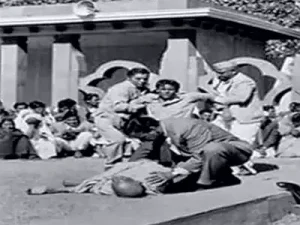The Assassination of Mahatma Gandhi: Unraveling Nathuram Godse’s Motives
On January 30, 1948, Mahatma Gandhi, the revered leader of India’s independence movement, was assassinated in New Delhi. The perpetrator, Nathuram Godse, a Hindu nationalist, shot Gandhi three times at point-blank range, shocking the nation and the world. The motivations behind this act have been analyzed and debated extensively, revealing a spectrum of perspectives from various sectors of society, as well as interpretations from different books and news articles.
Historical Context and Godse’s Ideology
Nathuram Godse was a staunch advocate of Hindutva, a political ideology that emphasizes the cultural and religious supremacy of Hindus in India. He, along with his accomplices, believed that Gandhi’s policies, particularly his stance on Hindu-Muslim unity, were detrimental to Hindu interests. Godse accused Gandhi of appeasing Muslims during the partition of India and believed that Gandhi’s advocacy for non-violence weakened India’s resolve against its adversaries.

Diverse Societal Reactions
In India, reactions to Gandhi’s assassination were varied and reflective of deep societal divisions. While many mourned Gandhi’s death as a tragic loss for India and the world, some segments of society sympathized with Godse’s motives. These included Hindu nationalists who saw Gandhi’s actions as compromising Hindu interests. Books such as “Why I Assassinated Mahatma Gandhi” by Gopal Godse, Nathuram Godse’s brother, provided insights into the assassin’s mindset and motivations, contributing to the discourse surrounding the event.
Media and Public Discourse
News articles from the time and subsequent analyses have painted different portraits of Nathuram Godse and his motivations. Some contemporary newspapers portrayed him as a fanatic driven by religious fervor, while others attempted to delve deeper into the socio-political climate that fueled his actions. The publication of Godse’s statements and the transcripts of his trial added fuel to the debate, sparking discussions about the limits of dissent in a newly independent India.
Scholarly and Analytical Perspectives
Scholars and historians have offered nuanced interpretations of Godse’s actions. While condemning the assassination as a reprehensible act of violence, some have explored the broader socio-political context in which it occurred. Books like “The Men Who Killed Gandhi” by Manohar Malgonkar and “Gandhi’s Murder and After” by Ramachandra Guha examine not only the event itself but also its implications for India’s trajectory as a democratic nation committed to pluralism and non-violence.
Conclusion
The assassination of Mahatma Gandhi remains a poignant chapter in India’s history, symbolizing the complexities of nationalism, religious identity, and political dissent. Nathuram Godse’s act continues to evoke strong emotions and debates, reflecting differing societal and ideological perspectives. By examining various books, news articles, and scholarly analyses, one gains a multifaceted understanding of why Godse killed Gandhi, illustrating how historical events resonate through different lenses of interpretation and memory.
